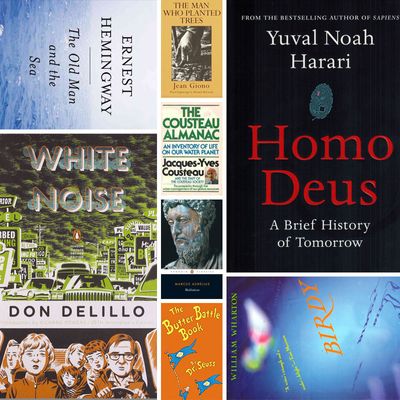
Bookseller One Grand Books has asked celebrities to name the ten titles they’d take to a desert island, and they’ve shared the results with Vulture. Below is Stranger Things star Matthew Modine’s list.
A Man Without a Country, by Kurt Vonnegut
This is collection of Vonnegut observations that will make you mourn his passing. We need a new Vonnegut today to make sense of the utter nonsense we’re living through. A writer with his obstinance, humanism, wit, and wisdom.
The Man Who Planted Trees, by Jean Giono
The story highlights how the positive actions of a single individual can transform the world we share. In this case, it’s the story about a Elzeard Bouffier, a humble shepherd who reforests a landscape destroyed by war. Try and find the version with the beautiful wood engravings by Michael McCurdy.
Food of the Gods, by Terence McKenna
For many years I was curious about human consciousness. How did we become conscious of our consciousness? McKenna argues, quite convincingly, that it may have been because of our hunter-gatherer ancestors consumption of psychotropic plants and herbs. Fun fact: The book was recommended to me by Whoopi Goldberg.
Birdy, by William Wharton
Okay, yeah, I did play Birdy in the film directed by the always amazing Sir Alan Parker. If you saw the movie, you should read the book. The hypnotic magic of Wharton’s prose is pure poetry. After you read the book, watch, or rewatch the film and see how right we actually got it.
White Noise, by Don DeLillo
All right, I said before that I missed Vonnegut. Well, Don DeLillo isn’t Vonnegut. And he’s not trying to be. He’s like Vonnegut and is an equal wordsmith. DeLillo is also a brilliant observer of life with a deliciously wicked sense of humor. He understands how best to employ irony and uses it to point out our collective anxieties and the absurdities of contemporary living. DeLillo is the shit.
Meditations, by Marcus Aurelius
Observations about life from a Roman emperor from almost 2,000 years ago. Remarkably fresh, simple, and pertinent. Filled with rational emotion and practical aphorisms. When I read this the first time, I felt like I was receiving loving guidance from a dear friend. The writing is that simple and relatable. Seriously, Marcus was an emperor, and you never feel like he’s talking down to the reader!
The Old Man and the Sea, by Ernest Hemingway
How can you not love the old fisherman, Santiago, and this great sea story by ol’ man Hemingway. Ernest won the Pulitzer and Nobel prizes for his efforts with this book. In many ways, the story echoes Herman Melville’s Moby-Dick. But Hemingway takes the reader much deeper into the personal journey of man versus nature. Through Santiago we are reminded of humility and the fragility of life. So vulnerable we are in our little boats floating in a universe unimaginably large and benign to the desires or passions of human ambitions.
Homo Deus: A Brief History of Tomorrow, by Yuval Noah Harari
Here we are. Top of the heap. Eight billion people crawling on every piece of earth available. Early humans learned that through cooperation they could, say, travel off our planet and walk on the moon. The question now is, can we survive another millennia? With all of our technology, science, medicine, an ever-exploding population, and an unending appetite for a finite amount of earthly resources, will we survive much longer?
The Butter Battle Book, by Dr. Seuss
Leave it to the Dr. to make simple sense of human stupidity. Like Stanley Kubrick’s masterpiece Dr. Strangelove, the story is about the real possibility of mutually assured destruction from the use of nuclear weapons.
The Cousteau Almanac of the Environment: An Inventory of Life on a Water Planet, by Jacques-Yves Cousteau
When I was a boy I dreamed of sailing and exploring the the open seas. I know my inspiration arose from watching episodes of The Undersea World of Jacques Cousteau. This almanac was the first gift I received from my then girlfriend, now wife, and why I still love her. She saw my passion for the ocean and presented me with a book by my hero. Cousteau gives many examples of how we have been destroying our shared environment for thousands of years. But more importantly, he always leads us to solutions we can implement to save and restore our planet. “We have one planet. We have to take care of it.”

